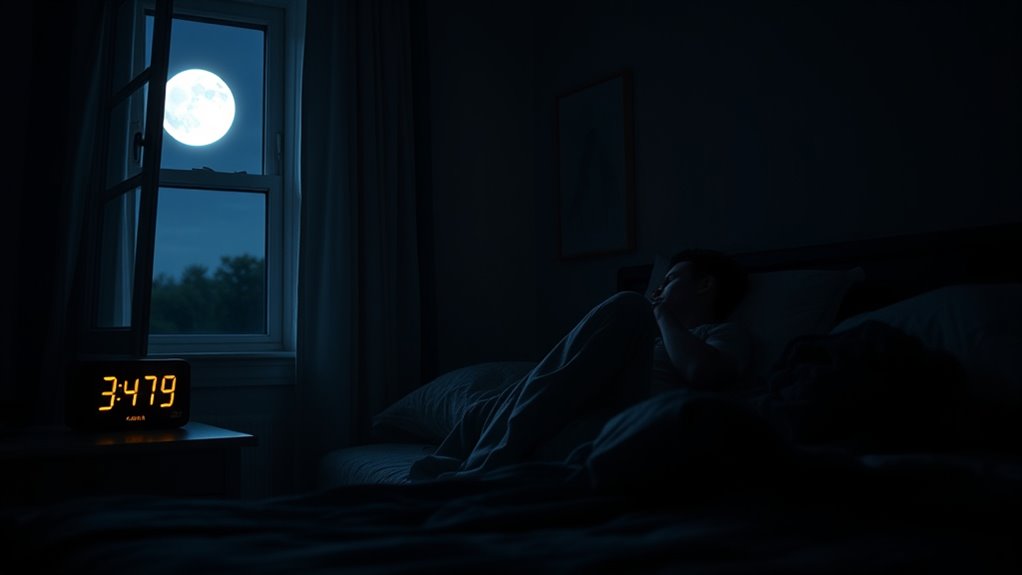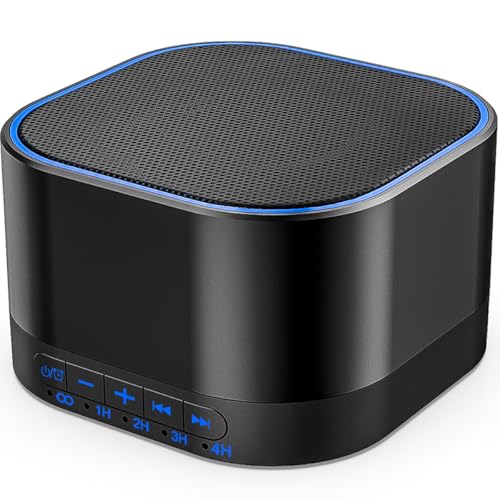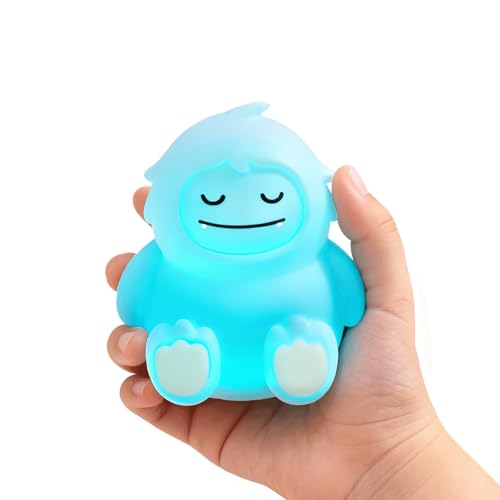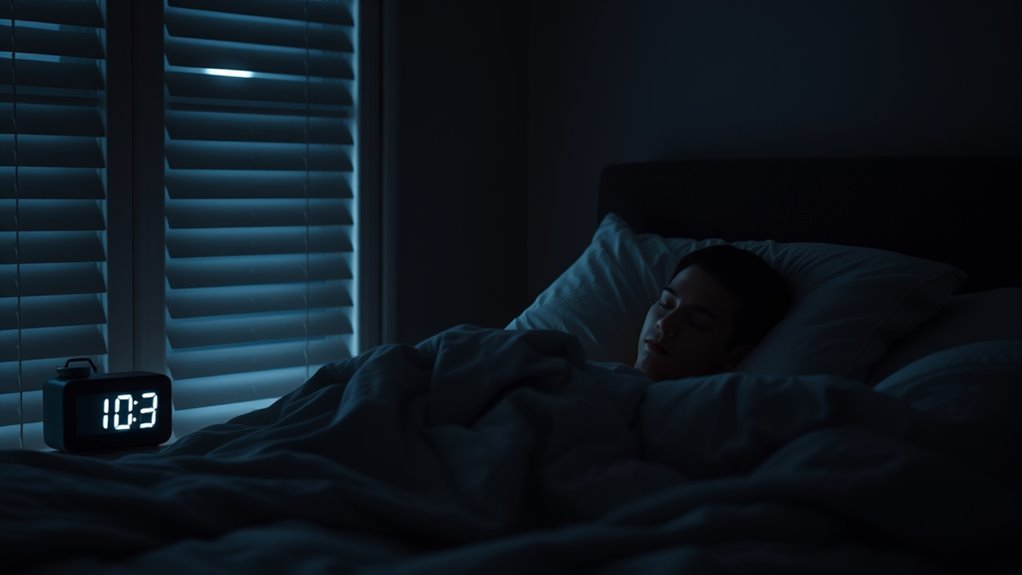When you wake up in the middle of the night, avoid turning on bright lights or engaging in stimulating activities, which can make it harder to fall back asleep. Try deep breathing, progressive muscle relaxation, or visualization techniques to calm your mind. If you’re still awake after 20 minutes, get out of bed and do a quiet, calming activity until you feel sleepy again. Keep exploring tips to improve your sleep and wake refreshed.
Key Takeaways
- Avoid turning on bright lights or engaging in stimulating activities if awake; opt for quiet, calming routines instead.
- Practice relaxation techniques like deep breathing or progressive muscle relaxation to ease back into sleep.
- Keep electronic devices out of reach and avoid screens to prevent blue light from disrupting melatonin production.
- If unable to fall asleep after 20 minutes, get out of bed and do a calming activity until feeling sleepy again.
- Maintain a consistent sleep environment—cool, dark, and quiet—to promote smoother transitions back to sleep.

Waking up in the middle of the night can be be frustrating, especially when it happens repeatedly. It disrupts your sleep cycle and leaves you feeling exhausted the next day. The key to managing these awakenings lies in understanding how your sleep environment and relaxation techniques can help you get back to sleep faster. Your sleep environment plays a vital role in promoting restful sleep. Make sure your bedroom is cool, dark, and quiet, as these conditions signal to your body that it’s time to rest. Invest in blackout curtains, use earplugs if necessary, and keep electronic devices out of reach to minimize light and noise disruptions. A comfortable mattress and pillows also support better sleep, reducing the chances of waking up suddenly. When you find yourself awake, avoid turning on bright lights or engaging in stimulating activities, as these can delay falling back asleep.
Creating a cool, dark, quiet sleep space helps you stay asleep longer and wake feeling refreshed.
Instead, focus on relaxation techniques to calm your mind and body. Deep breathing exercises can be highly effective; try inhaling slowly through your nose for a count of four, holding your breath for a count of seven, then exhaling slowly through your mouth for a count of eight. Repeat this cycle until you feel more relaxed. Progressive muscle relaxation is another method—tense each muscle group for a few seconds, then release, moving from your toes to your head. This helps reduce physical tension and promotes sleepiness. Visualization techniques, like imagining a peaceful place, can also distract your mind from worries, easing you into sleep.
It’s important to resist the urge to check the clock when you wake up, as this can increase anxiety about not sleeping and make it harder to fall back asleep. Instead, use a calming phrase or silently repeat a word like “relax” to yourself. If you’re still awake after 20 minutes, get out of bed and do a quiet, calming activity like reading a book under dim light or listening to soothing music. Avoid screens, as the blue light emitted can interfere with melatonin production, making it harder to sleep again. Additionally, understanding AI vulnerabilities and their potential impact on sleep-related technologies can help you stay informed about how emerging tech might influence your sleep environment.
Remember, consistency in your bedtime routine and environment helps reinforce your body’s natural sleep signals. Incorporate relaxation techniques into your nightly ritual so they become natural responses when you wake up. The goal isn’t necessarily to eliminate all awakenings but to learn how to manage them effectively. By optimizing your sleep environment and practicing calming techniques, you can minimize the frustration of middle-of-the-night awakenings and improve your chances of returning to restful sleep quickly.

NICETOWN Pitch Black Solid Thermal Insulated Grommet Blackout Curtains/Drapes for Bedroom Window (2 Panels, 42 inches Wide by 63 inches Long, Black)
READY MADE: Package only includes 2 blackout curtain panels, each 42" wide x 63" long when fully spread,…
As an affiliate, we earn on qualifying purchases.
As an affiliate, we earn on qualifying purchases.
Frequently Asked Questions
Can Medication Help With Middle-Of-The-Night Awakenings?
Medication can help with middle-of-the-night awakenings, but its effectiveness varies. Sleep aid options like short-term use of sleep medications or sedatives may provide relief, yet they’re not always a long-term solution. You should consult a healthcare professional to discuss potential risks and benefits, as medications can have side effects or interactions. Combining medication with good sleep habits often yields better results for managing these awakenings.
How Do Sleep Disorders Affect Nighttime Awakenings?
Ironically, sleep disorders often make your nights more unpredictable. Dream disturbances and hormonal fluctuations can wake you up unexpectedly, turning peaceful sleep into a series of interruptions. These issues disturb your sleep architecture, making it harder to stay asleep or achieve restful sleep. So, if you’re experiencing frequent awakenings, it’s likely your sleep disorder is disrupting your natural rhythms, leaving you exhausted despite spending hours in bed.
What Foods or Drinks Can Improve Sleep Continuity?
You can improve sleep continuity by choosing sleep-promoting snacks like bananas, almonds, or yogurt, which contain magnesium or tryptophan to help you relax. Herbal teas for sleep, such as chamomile or valerian root, also promote calmness before bed. Avoid caffeine and heavy meals near bedtime. Incorporating these foods and drinks into your routine can help you stay asleep longer and wake up feeling more refreshed.
Is It Normal to Wake up Multiple Times During the Night?
It’s normal to wake up a few times during the night, especially as part of healthy sleep patterns and sleep hygiene. Your body cycles through different sleep stages, including REM where dreams occur. If you wake frequently, it might disrupt your sleep continuity. Pay attention to your dream patterns and overall sleep habits, and consider adjusting routines like reducing screen time before bed or maintaining a consistent sleep schedule to improve sleep quality.
How Does Stress Influence Middle-Of-The-Night Awakenings?
Stress can substantially influence your middle-of-the-night awakenings by increasing cortisol levels, which disrupt your sleep cycle. When you’re stressed, your body produces more cortisol, making it harder to stay asleep or fall back asleep. Effective stress management techniques, like deep breathing or meditation, help lower cortisol levels, promoting more restful sleep. By managing stress, you can reduce nighttime awakenings and improve your overall sleep quality.

Magicteam White Noise Machine with 20 Non Looping Natural Soothing Sounds Memory Function 32 Levels of Volume Powered by AC or USB and Sleep Sound Timer Therapy for Baby Kids Adults Black
❤20 Non-Looping Sleep Sounds: White noise ,Brown noise, pink noise, blue noise, fan,brook, rain, ocean,bird and Bonfire,suitable for…
As an affiliate, we earn on qualifying purchases.
As an affiliate, we earn on qualifying purchases.
Conclusion
Don’t let middle-of-the-night awakenings ruin your sleep. It might seem frustrating at first, but with these strategies, you can break the cycle and enjoy restful nights again. Remember, it’s normal to wake occasionally—what matters is how you respond. By staying calm and practicing these tips, you’ll find it easier to fall back asleep. So, give it a try—peaceful, uninterrupted sleep is more achievable than you think.

yescool Weighted Blanket for Adults (20 lbs, 60” x 80”, Grey) Cooling Heavy Blanket for Sleeping Perfect for 190-210 lbs, Queen Size Breathable Blanket with Premium Glass Bead, Machine Washable
🌙【CHOOSE RIGHT WEIGHT】: Weighted blanket which owns 7%- 10% of your body weight is recommended. For example, a…
As an affiliate, we earn on qualifying purchases.
As an affiliate, we earn on qualifying purchases.

Breathing Pal Mini 'Yoyo' – Mindfulness Breathing Light, Guided Visual Meditation Breathing Light, Anxiety Relief Items for Calm Down Corner/Meditation/Sleep Aid for Adult/Kid
3 GUIDED BREATHING MODES WITH LIGHT CUES: Practice mindfulness with three effective techniques: 4-7-8 for anxiety relief, 5-5…
As an affiliate, we earn on qualifying purchases.
As an affiliate, we earn on qualifying purchases.









